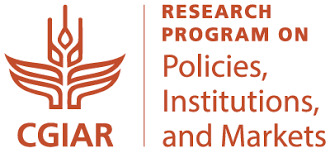
GENDER AND
SOCIAL INCLUSION
and approaches that drive
research to action
WHAT DOES GENDER AND SOCIAL INCLUSION HAVE TO DO WITH FORESTS AND TREES?
forests and tree-based landscapes for their livelihoods and well-being.
However, not all these people have equal power to decide how forests are managed or how resources are shared and distributed.‘Women, Indigenous Peoples and local communities, and other marginalized groups are often disempowered in policy regimes and by exclusionary social norms; their voices are rarely heard in decision-making processes. These structural barriers stand in the way of sustainable and equitable development goals.
To address these inequalities, the CGIAR Programs on Forests, Trees and Agroforestry (FTA) and Policies, Institutions and Markets (PIM) have developed a gender-sensitive project portfolio that explores the links between gender, economic development and forestry at multiple scales. At the heart of their activities, FTA, PIM and their partners strive to amplify the voices of forest-reliant women, men and youth from around the world through:


Strengthening capacities for women and other marginalized groups through workshops, trainings, and policy advocacy.
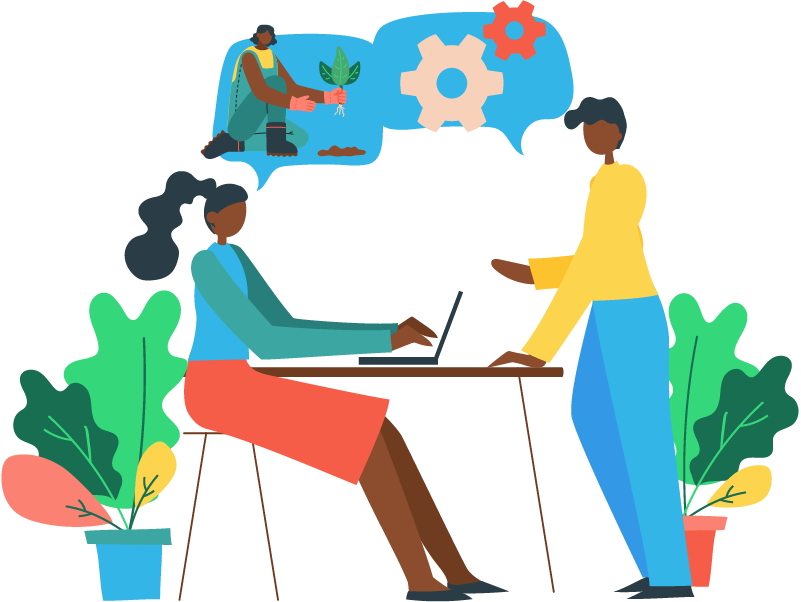
Ongoing monitoring, evaluation and reporting.


DIGITAL TOOLBOX HIGHLIGHTS
To learn more about FTA’s approaches to gender, social inclusion and intersectionality, read “the big picture” below and explore more of our blogs, videos and knowledge hubs.
Type of tools
Audience
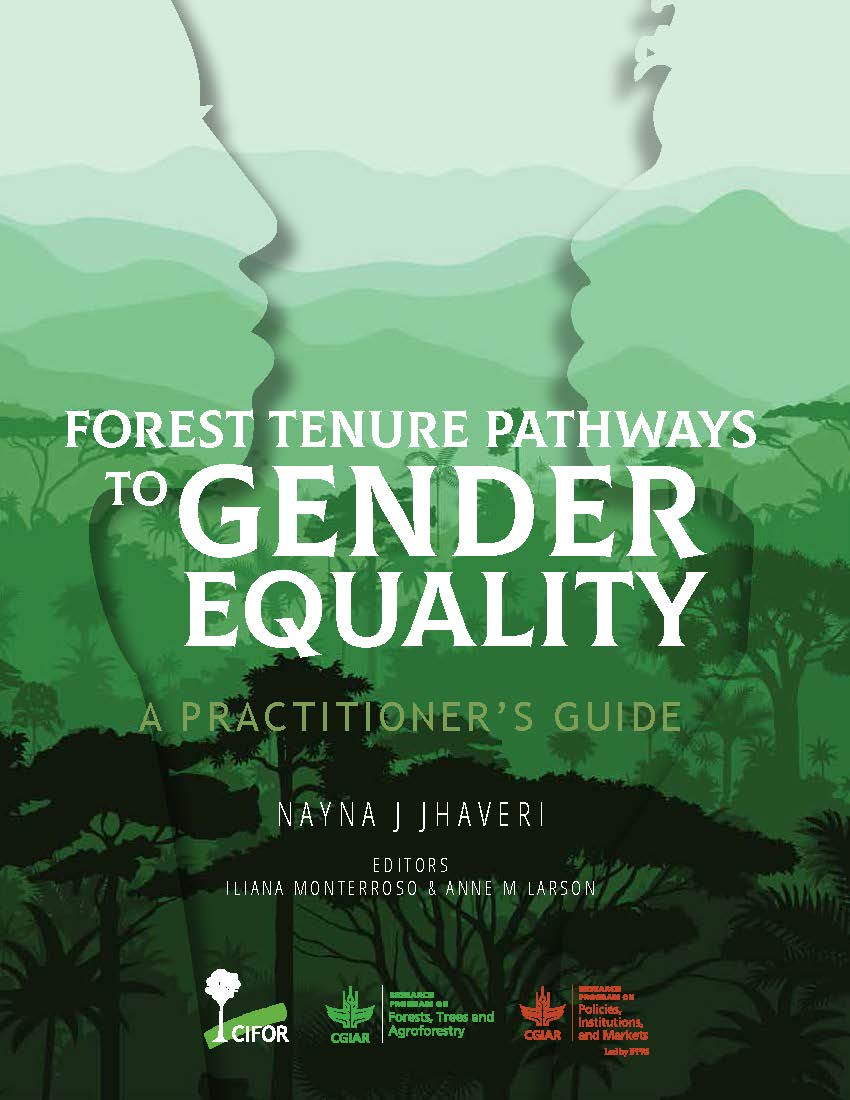
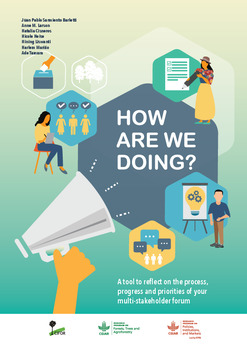
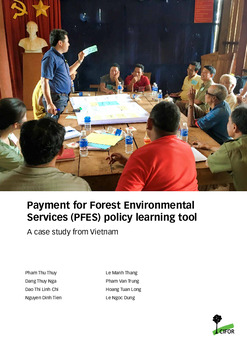

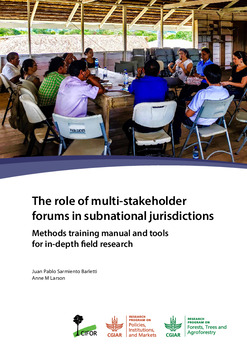

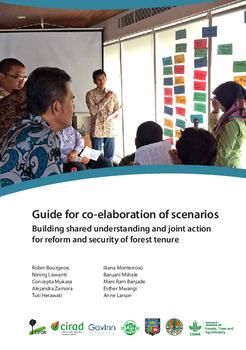


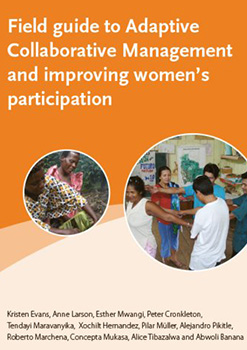

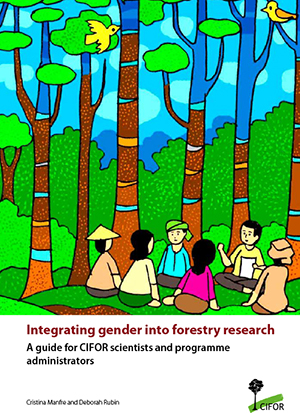
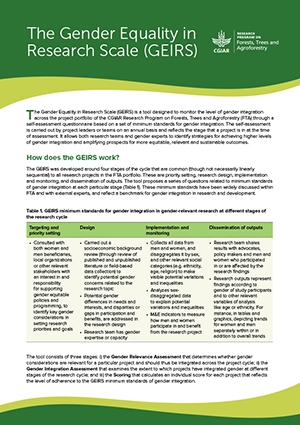
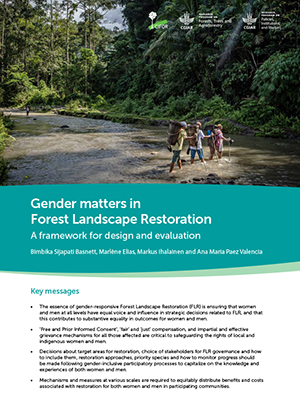
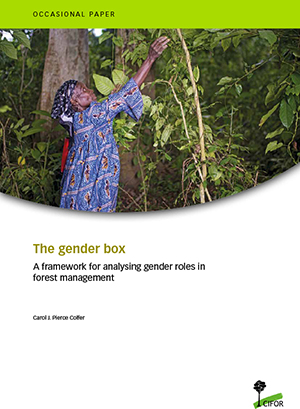
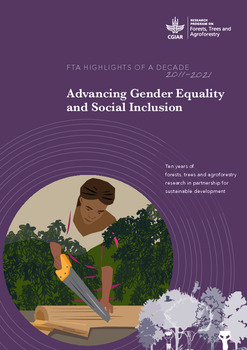




The Audience
multiple users who make up a ‘taskforce’ for implementation.

Individuals

Communities

Civil Society

Governments

Multistakeholder

Researchers
THEMATIC WORK AREAS

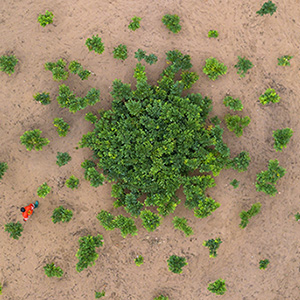
1Climate finance
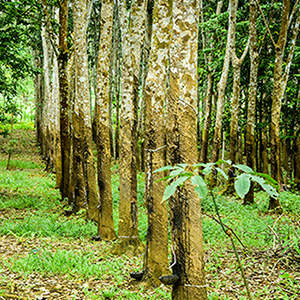
2REDD+
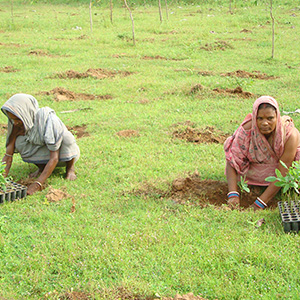
3Climate action and inclusion

4Inclusive value chains
- Where are women? A review and conceptual framwork for addressing gender equity in charcoal value chains in Sub-Saharan Africa
- Lessons on social inclusion for transformative forest-based bioeconomy solutions
- FTA Highlight No.10 – Sustainable Value Chains, Finance and Investment in Forestry and Tree Commodities
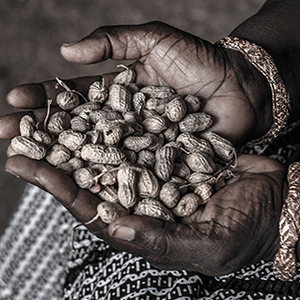
5Nutrition
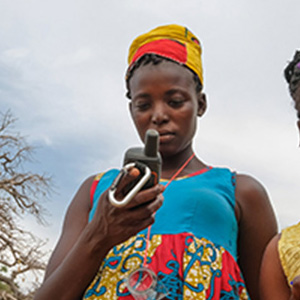
6Integrated Landscape
Approaches and Social Inclusion
- Leveraging climate finance for gender equality and poverty reduction: A comparative study
- Women’s Changing Opportunities and Aspirations Amid Male Outmigration: Insights from Makueni County, Kenya
- Savannah gendered transition: how woodlands dynamics and changes in fuelwood delivery influence economic autonomy in Mali
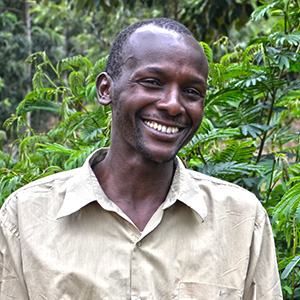
7Masculinities

8Restoration
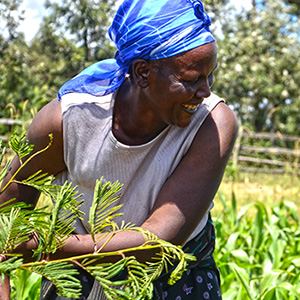
9Sustainable
Development Goals (SDGs)

10Youth

11Land tenure and
resource rights
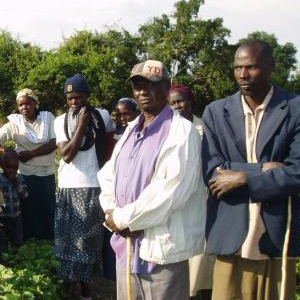
12Indigenous Peoples

THE BIG PICTURE
and social inclusion through research

Gender equality is a human right. Nevertheless, inequalities are often embedded in policies and social norms, creating a gender gap in access to key resources (e.g. land rights, loans, information and labour).
When imbalances based on gender or other forms of discrimination persist, they make it harder to build capacity and meet global targets such as the U.N. Sustainable Development Goals (SDGs). Aware of these issues, FTA and its partners have developed action plans and frameworks that combat gender biases in every part of their institutional structure and research. The frameworks and action plans highlighted here were designed to help scientists and research teams mainstream gender-related issues into forest, tree and agroforestry research.
Strategy documents
- Revised Research Agenda and Action Plan (2020-2021)
Based off of the first FTA Gender Strategy (2013), the latest action plan reflects the evolution of the program’s work. The new strategy offers updates on the methodology and themes in gender research and praxis and expands the focus on youth-related issues. - FTA Highlight No.15 – Advancing Gender Equality and Social Inclusion
This publication summarizes and reflects on FTA’s decade-long journey to advance gender equality in forest, tree and agroforestry landscapes. - Advancing gender equality through agricultural and environmental research: Past, present, and future
Frameworks and Guides
- The gender box:
A framework for analysing gender roles in forest management - Gender matters in Forest Landscape Restoration
A framework for design and evaluation - Making sense of ‘intersectionality’
A manual for lovers of people and forests - Integrating gender into forestry research
A guide for CIFOR scientists and programme administrators
Theory of change of gender integration in FTA
This infographic illustrates how FTA has applied the Theory of Change (ToC) to gender and social inclusion research. ToC is a structured process for identifying goals and creating strategies to meet those goals. The process drives engagement and outcomes to produce long-term impacts.
DOWNLOAD INFOGRAPHIC



Creating an avenue for women leaders
To celebrate women leaders and to pave the way to more empowered women and girls in the future, we turn to Iliana Monterroso and Sammy Carsan. These CIFOR-ICRAF scientists are building bridges to a more gender-inclusive society.
LISTEN TO PODCAST

TOOLS FOR COOPERATION AND
COLLABORATION
These tools focus on the proven need for inclusive participation in policy and decision-making processes. Multistakeholder forums (MSFs) and participatory workshops at the community level are two common approaches to spark meaningful collaboration between groups. To be effective, however, workshop organizers and participants must intentionally structure sessions to spotlight the voices of women and other marginalized groups. These are people who may otherwise remain silent or unheard (when they do participate) due to unequal power dynamics and socialization.
What are multistakeholder forums (MSFs)?
MSFs are organized sessions that bring together a wide range of stakeholders to engage in dialogue, decision making and/or the implementation of activities for common landscape goals. For example, women and men from different organisations can discuss issues of resource access and land ownership, developing alternative scenarios that would benefit everyone.
MSFs can take various forms such as meetings, conferences, congresses and summits. They can also have different names including platforms, processes, partnerships, sector working groups and networks. MSFs may meet one time or multiple times.



RESOURCES FOR MONITORING,
EVALUATION AND REPORTING
and policy-learning tools

Governments, civil society organizations and researchers all have an interest in measuring the impact of their work. These questionnaires, self-assessments and policy-learning tools were designed to help these groups report accurately on social inclusion gender-sensitive projects, policies and programs to help them also measure towards progress on social inclusion goals and processes.
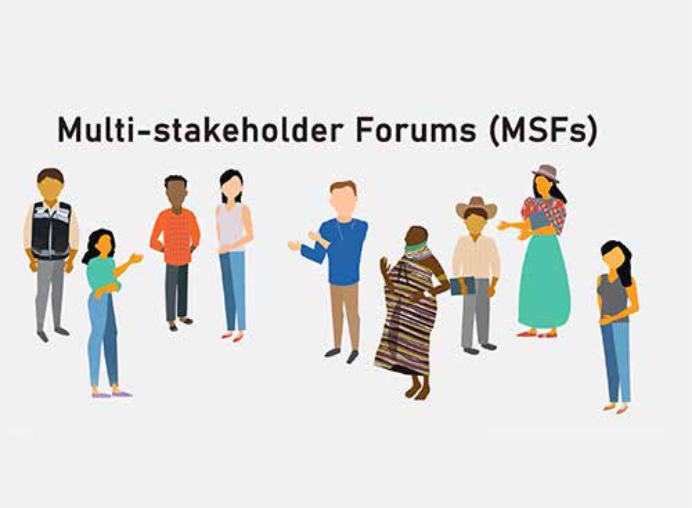
A guide to improve inclusion in multistakeholder forums
Effective participation of women and Indigenous Peoples is not an option, but a responsibility for organisers of multi-stakeholder forums seeking to ensure inclusion. The “Getting it Right” guide proposes steps to improve inclusion and increase the impact of women and Indigenous Peoples in current and future multi-stakeholder forums.
WATCH VIDEO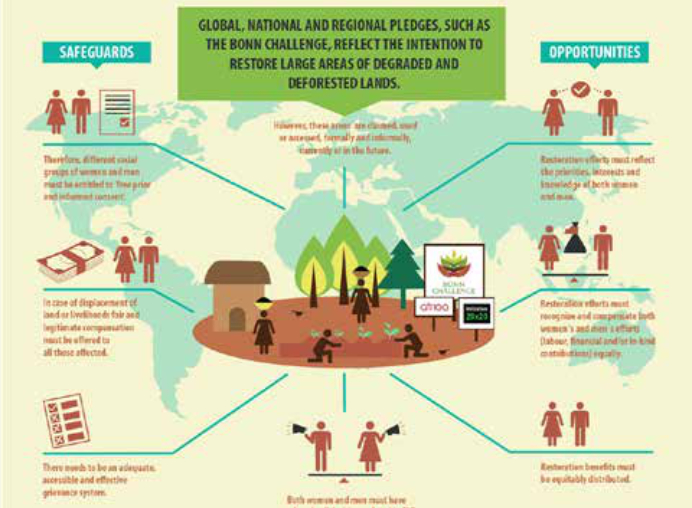
Gender Matters in Forest Landscape Restoration (FLR)
The following infographic defines gender-responsive landscape restoration that benefits women, men, youth and other social groups. It also identifies risks associated with ignoring gender dynamics in FLR projects Effective participation of women and Indigenous Peoples is not an option, but a responsibility for organisers of multi-stakeholder forums seeking to ensure inclusion. The “Getting it Right” guide proposes steps to improve inclusion and increase the impact of women and Indigenous Peoples in current and future multi-stakeholder forums.
DOWNLOAD INFOGRAPHIC

KEEP EXPLORING!
and its partners through these news posts, videos, infographics and more…
This digital toolbox contains a curated selection of tools and publications that promote inclusion.
NEWS
stories on gender, justice and tenure.
KNOWLEDGE HUBS
CGIAR Gender Platform
Gender Transformative Approaches (GTAs)
CIFOR-ICRAF Gender Team
Global Comparative Study on Forest Tenure Reform
Forests and Gender Projects
Gender-responsive research summary, Knowfor
Gender and Restoration
Gender and Climate Change
Adaptive Collaborative Management (ACM)
PUBLICATIONS
-
Leveraging climate finance for gender equality and poverty reduction: A comparative study
THEME: Climate finance
-
Mainstreaming gender in REDD+ policies and projects in 17 countries
THEME: REDD+
-
The forest frontier in the Global South: Climate change policies and the promise of development and equity
THEME: REDD+
-
Environmental Justice in the REDD₊ Frontier: Experiences from the Amazon and Beyond
THEME: REDD+
-
Rights abuse allegations in the context of REDD+ readiness and implementation: A preliminary review and proposal for moving forward
THEME: REDD+
-
Land and carbon tenure: Some – but insufficient – progress
THEME: REDD+
-
Beyond dichotomies: Gender and intersecting inequalities in climate change studies
THEME: Intersectionality
-
What should be included in the Green Climate Fund’s new Gender Policy and Action Plan?: Lessons from CIFOR’s research and analyses
THEME: Intersectionality
-
A synthesis of convergent reflections, tensions and silences in linking gender and global environmental change research
THEME: Intersectionality
-
FTA Highlight No.10 – Sustainable Value Chains, Finance and Investment in Forestry and Tree Commodities
THEME: Inclusive value chains
-
Lessons on social inclusion for transformative forest-based bioeconomy solutions
THEME:
-
Intersecting and dynamic gender rights to néré, a food tree species in Burkina Faso
THEME: Nutrition/inclusive value chains
-
Where are the women? A review and conceptual framework for addressing gender equity in charcoal value chains in Sub-Saharan Africa
THEME: Inclusive value chains/nutrition
-
Women’s access, equity and empowerment: Progress and uptake of the Fairtrade gender strategy
THEME: Inclusive value chains/nutrition
-
Integrated landscape approaches in the tropics: A brief stock-take
THEME: Integrated landscape approaches
-
Women’s Changing Opportunities and Aspirations Amid Male Outmigration: Insights from Makueni County, Kenya
THEME: Integrated landscape approaches
-
Savannah gendered transition: how woodlands dynamics and changes in fuelwood delivery influence economic autonomy in Mali
THEME: Integrated landscape approaches
-
Understanding gender dynamics in the context of rural transformation processes: An East Kalimantan case study
THEME:
-
Can multi-stakeholder forums mediate indigenous rights and development priorities? Insights from the Peruvian Amazon
THEME: REDD+/Integrated landscape approaches
-
Masculinities in Forests: Representations of Diversity
THEME: Masculinities
-
Gender matters in Forest Landscape Restoration: A framework for design and evaluation
THEME: Restoration
-
Ten people-centered rules for socially sustainable ecosystem restoration
THEME: Restoration
-
Onto the Farm, into the Home:
How Intrahousehold Gender Dynamics Shape Land Restoration in Eastern Kenya
THEME: Restoration
-
Gender equality and forest landscape restoration infobriefs
THEME: Restoration
-
Can multistakeholder forums empower indigenous and local communities and promote forest conservation? A comparative analysis of territorial planning in two Brazilian states with contrasting contexts
THEME: Restoration/REDD+
-
Chapter 5 – SDG 5: Gender Equality – A Precondition for Sustainable Forestry
THEME: SDGs
-
Approaching rural young people
THEME: Youth
-
What’s the Story on Agriculture? Using Narratives to Understand Farming Households’ Aspirations in Meru, Kenya
THEME: Youth
-
Not All About Farming: Understanding Aspirations Can Challenge Assumptions About Rural Development
THEME: Youth
-
Is the Formalization of Collective Tenure Rights Supporting Sustainable Indigenous Livelihoods? Insights from Comunidades Nativas in the Peruvian Amazon
THEME: Land tenure and resource rights
-
Mobilizing Change for Women Within Collective Tenure Regimes
THEME: Land tenure and resource rights
-
Lessons on social inclusion for transformative forest-based bioeconomy solutions
THEME: Indigenous Peoples and local communities
-
Rights abuse allegations in the context of REDD+ readiness and implementation: A preliminary review and proposal for moving forward
THEME: Indigenous Peoples and local communities
-
Land and carbon tenure: Some – but insufficient – progress
THEME: Indigenous Peoples and local communities
-
Commons, indigenous rights, and governance
THEME: Indigenous Peoples and local communities
-
Is the Formalization of Collective Tenure Rights Supporting Sustainable Indigenous Livelihoods? Insights from Comunidades Nativas in the Peruvian Amazon
THEME: Indigenous Peoples and local communities
-
¿Cómo vamos? Una herramienta para reflexionar sobre la participación de las mujeres indígenas u originarias en la gestión y gobernanza de sus territorios
THEME: Indigenous Peoples and local communities
-
Can multi-stakeholder forums mediate indigenous rights and development priorities? Insights from the Peruvian Amazon
THEME: Indigenous Peoples and local communities
-
Can multistakeholder forums empower indigenous and local communities and promote forest conservation? A comparative analysis of territorial planning in two Brazilian states with contrasting contexts
THEME: Indigenous Peoples and local communities
ACKNOWLEDGEMENTS

